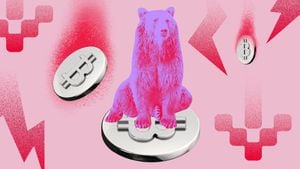Tokyo Electron's stock has witnessed dramatic fluctuations recently, reflecting broader market volatility tied to the semiconductor equipment sector. Over the last few weeks, concerns have mounted over regulatory pressures from the U.S. government aimed at restricting semiconductor equipment exports to China, leading to significant price drops for associated firms.
According to Bloomberg, reports surfaced on February 25 indicating the Trump administration is pushing major allied nations, such as Japan and the Netherlands, to tighten their semiconductor regulations concerning China. This follows efforts previously initiated under the Biden administration to limit China's technological capabilities.
During trading sessions, Tokyo Electron saw its share price drop sharply, hitting lows at ¥24,340, which marked a decline of as much as 4.4% from the previous week's close. Other companies, including Advantest, Disco, and Screen Holdings, also exhibited declines amid these developments.
“The pressure for stricter semiconductor regulations is somewhat expected,” noted Andrew Jackson, chief strategist for Japanese stocks at Altus Advisors, pointing out the prior warnings about tightening regulations affecting semiconductor-related stocks, including Tokyo Electron.
Discussions between U.S. officials and representatives from Japan and the Netherlands reportedly included consultations over maintenance limits for equipment used by Tokyo Electron and ASML engineers working within China. These talks suggest growing concerns within the U.S. government over the direct ties companies like Tokyo Electron have with the Chinese semiconductor market.
The pressure from the Trump administration is touted to include stricter enforcement of existing regulations and potentially new methods of restricting the types and amounts of semiconductor products exported to China without licenses.
Interestingly, the turbulence for Tokyo Electron didn't end there. Following news of decreasing orders and anticipated shifts toward artificial intelligence chips, hopes briefly rose as the demand for Nvidia's H20 chips from Chinese firms surged due to their adoption of DeepSeek's AI models. This rebound saw shares of Tokyo Electron climb back to positive territory, albeit temporarily.
Despite the ups and downs, the overarching sentiment remains cautious. The outlook for the semiconductor sector, particularly concerning China, is uncertain. Tokyo Electron's president, Toshiki Kawai, indicated during recent interviews and discussions at the Semicon Korea trade show held from February 19-21, 2023, the company's plans to hire up to 10,000 new employees over five years, reflecting optimism about potential future demand.
While profits for the fiscal year 2024 surged due to increased orders for advanced AI semiconductor manufacturing equipment, the reliance on China remains precarious. Kawai commented, “We might need to hire more staff depending on market needs, particularly with developments involving AI and robotics specialties.”
Reports state Tokyo Electron's revenue rose by 38% year-on-year, reaching ¥1.77 trillion, with net profits climbing by 68% to about ¥401.1 billion. This swift growth highlights the duality of opportunities and challenges presented by AI advancements and the regulatory environment associated with semiconductors.
Moving forward, Tokyo Electron plans to increase investments significantly, with estimated R&D costs set for record levels as they prepare to adapt to next-generation semiconductor production.
Nevertheless, looming regulatory uncertainties will likely temper investor enthusiasm. Analysts project fluctuations will continue, particularly as key trading relationships with China undergo scrutiny and adjustments continue to emerge from Washington.
The broader semiconductor market is seemingly bifurcated, with differing fortunes across sectors. While AI-related investments remain strong, sectors linked to automotive and industrial applications are reportedly softening.
Regulatory pressures, combined with market realities, raise pressing questions about the sustainability of growth trajectories for companies like Tokyo Electron. Stakeholders are advised to proceed carefully as the sector navigates these treacherous waters amid geopolitical tensions.
Some analyst views point to the potential for government pressure diminishing as businesses strategize to align with new requirements. Recent discussions between U.S. officials and industry leaders suggest the need for collaboration on supply chains and technological advancements, potentially paving the way for more predictable market environments.
What continues to remain questionable is the degree to which companies like Tokyo Electron can sustain momentum against the backdrop of intense scrutiny and market volatility. The next several months will be pivotal for observing how these factors play out and their lasting impacts on the semiconductor industry's dynamics.



